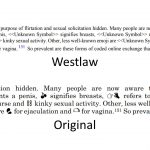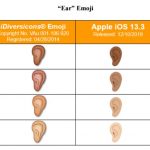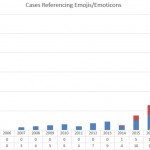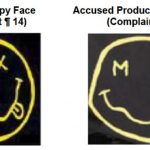
My California Young Lawyers Association Interview About Emojis
[In August, I did an interview with Skyler Gray that ran in the California Young Lawyers Association newsletter.] How did an intersection of emojis and the law begin? Were there legal issues concerning the original punctuation emojis, such as “:)”…

Copyright Owner Claims Ownership Over Depicting Emoji Symbols in Multiple Colors–Cub Club v. Apple
[Reminder: our country is falling apart. Focus on that until the election, then revisit this post.] My Emojis and the Law paper argued that: (1) the diversity of emoji depictions (sometimes called fragmentation) creates potential misunderstandings that cause a host…

Australian Court Says Using a Zipper-Mouth Emoji Can Be Defamatory–Burrows v. Houda
This case involves a Twitter thread discussing the plaintiff’s alleged misconduct as a lawyer. I’m still looking for the original thread (some or all of it appears to be deleted based on my attempts to find it on Twitter) or…

Emojis Keep Teen Out of Jail–State v. DRC
Tomorrow is World Emoji Day (named because most calendar emojis depictions show July 17 on the calendar). To celebrate the power of emojis, I’m blogging a case where emojis helped a teen avoid jail. DRC and her mom were having…
What is a “True Threat” Online?–In re. R.D.
This case involves a Twitter war of words between high schoolers shortly after a local school shooting. Some tweets may have been quoted song lyrics, others were typical nonsense teen bluster, and some may have been legally prosecutable threats. The…

Can a “Fire” Emoji Support a Manslaughter Conviction?–Johnson v. State
Johnson and Roe were drug users. They split a purchase of heroin, which turned out to contain fentanyl. Roe died from ingesting it. Johnson was charged with, among other things, involuntary manslaughter for providing the heroin to Roe. The court…

2019 Emoji Law Year-in-Review
Some highlights from emoji law in 2019: (Continued) Exponential Growth of Case References I found 101 cases in 2019 that referenced “emoji” or “emoticon.” That nearly doubles the number from 2018, reinforcing that emoji law continues to grow exponentially. You…

The Israeli Chipmunk Emoji Mystery Resolved!
One of the most celebrated cases in emoji law is Dahan v. Shakaroff, an Israeli decision involving a landlord’s claim that prospective tenants Nir and Yarden (a married couple) engaged in bad faith negotiations over leasing an apartment. At issue…

Troublesome Emojis in Criminal Cases (Guest Blog Post)
By guest bloggers Jeff Breinholt and Madeline Brewer [Jeff is an Adjunct Professor at George Washington University Law School. Madeline is an LLM Candidate at George Washington University Law School] Emojis are frequently showing up in court cases throughout the…

More Evidence That IP Law Protects Individual Emoji Depictions–Nirvana v. Marc Jacobs
This case involves the well-known “Nirvana Happy Face” drawn by Kurt Cobain in 1991 and registered in 1993. Marc Jacobs launched a “Bootleg Redux Grunge” clothing line (really??? who buys this shit?) that included an homage to the Nirvana Happy…
